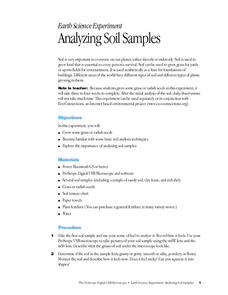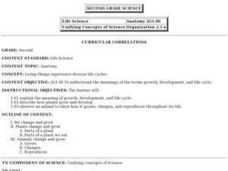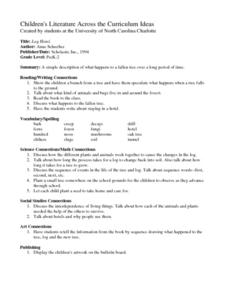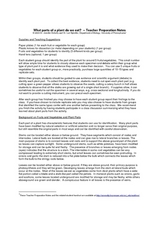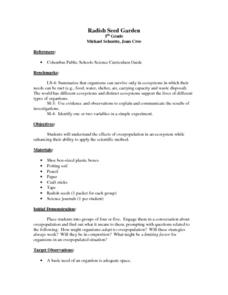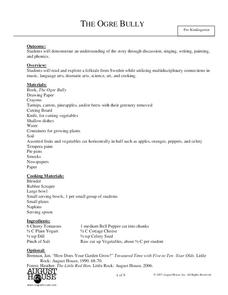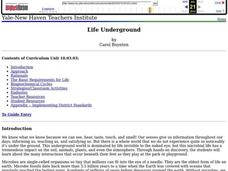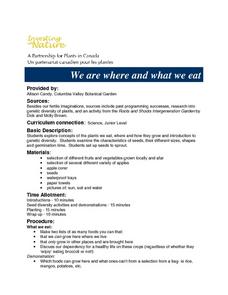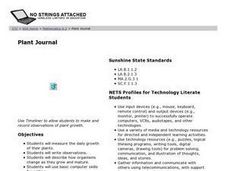Curated OER
Analyzing Soil Samples
Students grow grass or radish seeds in this experiment, which takes three to four weeks to complete. They become familiar with basic soil analysis techniques, as well as, explore the importance of analyzing soil samples.
Curated OER
Living Things Experience Diverse Life Cycles
Second graders will study and explain the meaning of growth, development, and life cycle. They describe how plants grow and develop and observe an animal to show how it grows, changes, and reproduces throughout its life.
Curated OER
Forest In A Jar
Students conduct an experiment using soil, water, seeds, a plant, and a jar; and then draw a poster to represent their observations and findings. They make a poster showing what happened to their aquatic environment.
Curated OER
Graphing the Population Explosion of Weeds
Students are introduced to the seed cycle and draw the specific steps. In groups, they identify the human barriers to the spreading of weeds. After calculating the rate of spreading of the Yellowstar Thistle, they create graphs to see a...
Curated OER
Log Hotel
Learners identify how the different plants and animals work together to cause the changes in the log. Students discuss the sequence of events in the life of the tree and log. Learners plant a seed to take home and care for. Students...
Curated OER
Flowers, Pods, and Seeds
Students gain an understanding of living organisms. the complete a plant growth data log to chart plant growth and to make observations, predictions, and personal reflections.
Curated OER
Plant Parts
Students create a model of the parts of a plant. After reviewing the parts of a plant and their function, students working in groups, construct a plant using various provided materials. Their models are labeled and presented to the...
Curated OER
Which Parts of a Plant Do We Eat?
Young scholars identify the different parts of a plant. In this biology lesson, students examine its internal parts by dissecting it. They report their findings in class.
Curated OER
Radish Seed Garden
Fifth graders explore the effects of overpopulation in an ecosystem while applying the scientific method. They discuss overpopulation and its meaning. Students as an organism competes for space in an overpopulated area. They plant...
Curated OER
The Ogre Bully
Students listen to the book, The Ogre Bully, and discuss the problems the farmer and his family had during the story. In this garden themed lesson, students examine different fruit and vegetables and plant them in soil to grow. ...
Curated OER
Life Underground
First graders build a terrarium in order to observe animal and plant life dynamics. In this biology lesson plan, 1st graders compare how organisms survive in different environments. They write their observations and analysis in their...
Curated OER
Flower Power
Pupils investigate and explain the basic needs and life processes of plants. Key concepts include: living things change as they grow and need food, water, and air to survive. The reverse of the Kansas quarter serves as inspiration.
Curated OER
Salinity Of Soil
Fourth graders investigate the contents of various types of soil to determine the differences in salinity levels. They conduct an experiment of observing the plants in the different soils. Students then determine survival rates by...
Curated OER
Plant Reproduction
Students investigate seeds and plant life by creating a germination chamber. In this botany lesson, students investigate the relationship between flowers and the fruit they produce while examining the structure of the flower. Students...
Curated OER
Observing Root Response After Rotating Plant Ninety Degrees
Students conduct an experiment to observe the response of maize roots when rotated 90 degrees.
Curated OER
We are where and what we eat
Students explore concepts of plants they eat, where and how they grow and are introduced to genetic diversity. They examine seed characteristics, look at their different sizes, shapes and germination time. They also set up seeds to...
Curated OER
Archaeobotany
Students study pictures of seeds and the conditions in which they grow during their study of archaeobotany. They infer ancient plant use by looking at archaeobotanical samples. They determine the change of plant use by interpreting a...
Curated OER
Forget-Me-Knots in a Pot
Young scholars discuss Alaska's state flower and grow their own flowers in pots. They discover skills needed for gardening and plant care. Once students have researched the state flower, they draw pictures of forget-me-knots and list...
Curated OER
Dune Plan Adaptations
Young scholars tour Coal Oil Point Reserve. They locate the species of plants that are on the handouts ,and describe the different adaptations used by plants in their specific area of the dunes.
Curated OER
Spring Fling
Students take part in a number of activities that center around a spring theme. They draw the steps to show process of growing seeds.
Curated OER
Using the Scientific Method to Determine Which Conditions Best Favor Plant Growth
Seventh graders examine how the environment can affect biological processes. They identify the best conditions for the germination of bean seeds. They record and analyze their data. They write about their observations in an essay.
Curated OER
Bean and Ozone Project
Students performed an experiment in which they grew beans in an ozone chamber and some in regular air in order to see if the ozone causes damage to the plants.
Curated OER
Plant Journal
Young scholars measure the daily growth of plants in this technology-based science lesson plan that uses Timeliner to record student data. The lesson plan allows students practice at basic computer skills (typing/data entry).
Curated OER
Parts of a Plant
Students record observations about parts of plants including leaves, roots, stems, and flowers. They use Kid Pix to draw a picture of a plant and to label the parts of the plant.


